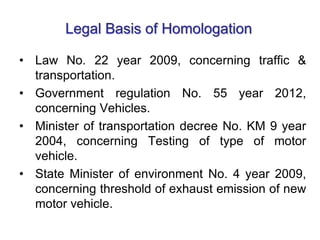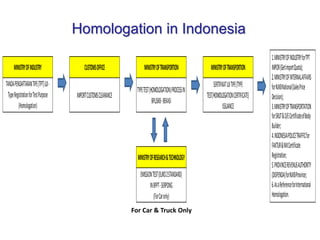Homologation test of vehicle in Indonesia
- 2. Homologation is a technical term, derived from the Greek, Homologeo (ßĮü╬╝╬┐╬╗╬┐╬│╬ŁŽē), for "to agree", which is generally used in English to signify the granting of approval by an official authority. This may be a court of law, a government department, or an academic or professional body, any of which would normally work from a set of strict rules or standards to determine whether such approval should be given.
- 3. Homologation in automotive industry is the process of certifying that a particular car is roadworthy and matches certain specified criteria laid out by the government for all vehicles made or imported into the country. All of tests in homologation ensure that the vehicle matches the technical requirements of the market in terms of emission and safety and road-worthiness as per the Motor Vehicle Rules.
- 4. Technical Requirements of vehicle include : - Construction; - Equipment; - Measurement; - Engineering; - Technical Design of vehicle as intended.
- 5. Road-worthiness of vehicle include : - Exhaust emission level - Turning radius - Noise level - Speedometer accuracy - Main brake system - Performance of Tire - Parking brake system - Tread of Tire - Horn sounding level - Suitability of Power weight - Highlight ability and ratio. direction of Head Lamp
- 6. Legal Basis of Homologation ŌĆó 1958 Agreement (UN Regulation) : Agreement concerning the adoption of uniform technical prescriptions for motor vehicles, equipment and parts which can be fitted and/or be used on motor vehicles and the conditions for reciprocal recognition of approvals granted on the basis of these prescriptions. Each contracting party's type approvals are recognized by all other contracting parties. There are 58 participant countries on this Agreement as of now.
- 7. Legal Basis of Homologation ŌĆó Law No. 22 year 2009, concerning traffic & transportation. ŌĆó Government regulation No. 55 year 2012, concerning Vehicles. ŌĆó Minister of transportation decree No. KM 9 year 2004, concerning Testing of type of motor vehicle. ŌĆó State Minister of environment No. 4 year 2009, concerning threshold of exhaust emission of new motor vehicle.
- 8. Homologation in Indonesia MINISTRYOFINDUSTRY CUSTOMSOFFICE MINISTRYOFTRANSPORTION MINISTRYOFTRANSPORTION TANDAPENDAFTARANTIPE(TPT)UJI- TypeRegistrationforTestPurpose (Homologation) IMPORTCUSTOMSCLEARANCE TYPETEST(HOMOLOGATION)PROCESSIN BPLJSKB-BEKASI SERTIFIKATUJITIPE(TYPE TEST/HOMOLOGATIONCERTIFICATE) ISSUANCE MINISTRYOFRESEARCH&TECHNOLOGY EMISSIONTEST(EURO2STANDARD) INBPPT-SERPONG (ForCaronly) 1.MINISTRYOFINDUSTRYforTPT IMPOR(GetimportQuota); 2.MINISTRYOFINTERNALAFFAIRS forNJKBNational(SalesPrice Decision); 3.MINISTRYOFTRANSPORTATION forSRUT&D/ECertificateofBody Builder; 4.INDONESIAPOLICETRAFFICfor FAKTUR&NIKCertificate Registration; 5.PROVINCEREVENUEAUTHORITY (DISPENDA)forNJKBProvince; 6.AsaReferenceforInternational Homologation. For Car & Truck Only
- 9. Detail of New Vehicle Type ŌĆó Engine : Tipe/Model, Configuration, Fuel, Cylinder volume, Power, Location and Torque; ŌĆó Suspension : Coil spring, Leaf spring, Torsion bar, Air spring and Hydro pneumatic; ŌĆó Wheelbase; ŌĆó Tread width; ŌĆó Transmission : Manual, Automatic, 4x2 and 4x4; ŌĆó Body frame : Chassis, Monocoque and Semi monocoque; ŌĆó Kind of Brake : Disk, Drum and Combination Disk & Drum; ŌĆó Brake System : Hydraulic, Pneumatic, Hydro-pneumatic, Mechanic, Booster usage and Parking brake operation. Discrepancies out of above details is become to a VARIANT.
- 11. Homologation/Type Test Certification Procedure in MOTr
- 12. Procedure of approval for research on design & engineering of motor vehicle Procedure in MOTr
- 14. Sertifikat Uji Tipe (Homologation Certificate)
- 15. Homologation test preparation ŌĆó Ensure technical data & supporting documents are correct & completed before submitting to homologation authority; ŌĆó Have knowing the technical and physical matters of the vehicle to be tested; ŌĆó Ensure the vehicle has no problems and ready for testing properly (doing pre-homologation test is recommended); ŌĆó Approaching officers in BPLJSKB & BTMP for delivering the test result to MOTr for issuance of SUT (Homologation Certificate) on time.
- 16. For more info : Irfan Arief Tel. : +62 85888798667 Email : iaarief@gmail.com

















